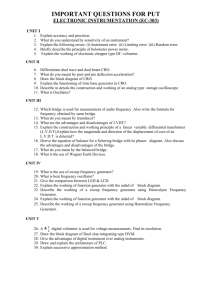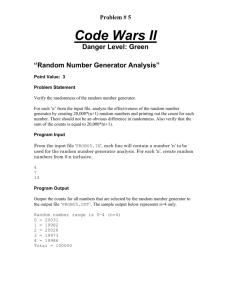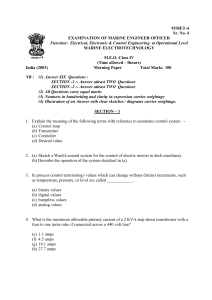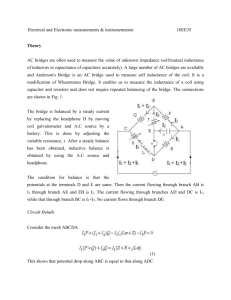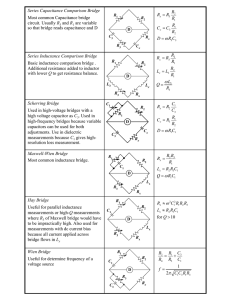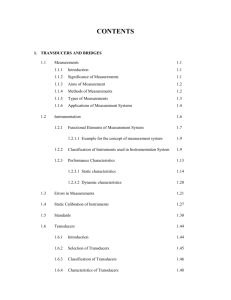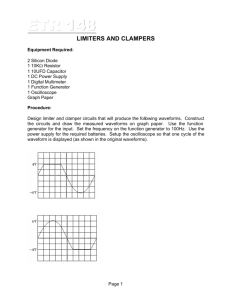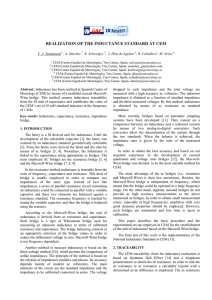BRIDGES IMPEDANCE MEASUREMENT Experiment # 4 EE 312
advertisement
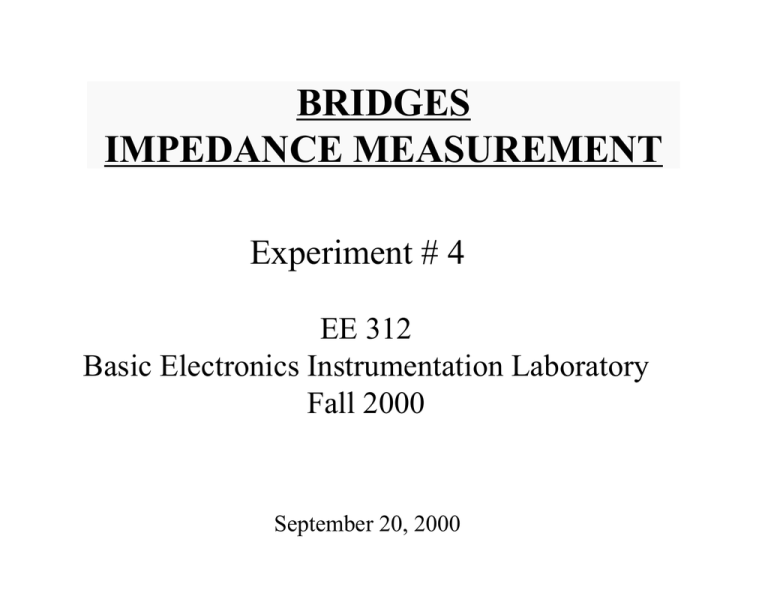
BRIDGES IMPEDANCE MEASUREMENT Experiment # 4 EE 312 Basic Electronics Instrumentation Laboratory Fall 2000 September 20, 2000 OBJECTIVES: • The first objective of this experiment is to learn how to use bridges used to measure values for Resistance R, Capacitance C, & Inductance L • The second objective is to determine the precision, accuracy and probable error in the measured values. In this experiment, you will learn to measure: Resistance Capacitance Inductance using a using a using a Wheatstone Bridge, Desaulty Bridge*, Maxwell Bridge. * The name Desaulty could not be found in IEEE Standard Dictionary of Electrical & Electronics Terms, IEEE-Std-100-1992. Components: 1 Isolation Transformer (1:1) 2 Four Resistance Boxes – a) Heathkit Precision Box c) EICO Industrial Box – b) Industrial Precision Box d) Heathkit Substitution Box 3 Two Capacitance Boxes & Two Capacitors – a) Precision Box – b) Substitution Box 4 1mH Inductor c) Unknown Capacitor d) 200 uF Capacitor Experiment # 4 Part I- Resistance Measurement • Wheatstone Bridge Part II- Capacitance Measurement • DeSaulty Bridge Part III- Inductance Measurement • Maxwell Bridge At balance I = 0 Z1 . Z4 = Z2 . Z3 Z3 Z1 Function Function Generator Generator I Z2 Z4 At balance I = 0 The voltages on each side of the meter must be equal. Thus V(FG) x Z2/(Z1+Z2) = V(FG) x Z4/(Z3+Z4) Cross multiply and simply to obtain Z2 . Z3 = Z1 . Z4 Part I- Resistance Measurement R3 R1 1 kHz 2b 200 uF 2a Oscilloscope Function Generator 2c R2 2d R4=? Z2 . Z3 = Z1 . Z4 R2 . R3 = R1 . R4 R4 = R3 x (R2/R1) R4 = R3 ÷ (R1/R2) If R3 is viewed as the standard, then the unknown R4 equals the standard multiplied by the ratio R2/R1 or divided by the ratio of R1/ R2. The sharpest null is obtained by keeping the ratio R2/R1 = 1. However, this can be done only if a standard equal to the unknown is available. Record values for R1, R2, R3, & R4. • Transformer between the function generator and the bridge is used to isolate grounding of the bridge circuit as shown. This, in turn, makes possible the use of a single channel of the oscilloscope instead of a differential mode for balancing the bridge. Function Generator Oscilloscope • The capacitor between the function generator and the transformer is used to prevent accidental dc bias to the transformer and electrical shock if a lead is disconnected. Function Generator Oscilloscope d I V (t) = L × dt Part II- Capacitance Measurement C1 R1 2b 200 uF 3a Oscilloscope Function Generator 2c R2 3b C2= ? Z2 . Z3 = Z1 . Z4 R2 . (1/j7C1) = R1 . (1/j7C2) & R2C2 = R1C1 C2 = C1 x (R1/R2) C2 = C1 ÷ (R2/R1) If C1 is viewed as the standard, then the unknown C2 equals the standard multiplied by the ratio R1/R2 or divided by the ratio of R2/ R1. The sharpest null is obtained by keeping the ratio R2/R1 = 1. However, this can be done only if a standard equal to the unknown is available. Record values for R1, R2, C1, & C2. A capacitor of unknown (to you) value will be supplied by an instructor. Measure the value of this capacitance and then find out from the instructor what the actual value is. Part III- Inductance Measurement L3 R1 2b 200 uF Function Generator R3 4 C2 3a R2 2c 2a R4 L3=? R1 R3=? 200 uF Function Generator C2 R2 R4 - Measure the values for inductance L3 of an unknown inductor and its internal resistance R3. The nominal inductance equals 1 mH. - Measure the dc value for the resistance R3 of the inductor with a Fluke DMM. Skin effect could cause the ac resistance to increase as the ac frequency increases. Can you explain skin effect? L3=? R1 R3=? 200 uF Function Generator Z1 × Z 4 = Z 2 × Z 3 R1 × R4 = ( R3 + j ⋅ L3 ⋅ ω ) ⋅ ( C2 R4 R2 1 1 ( + j ⋅ ω ⋅ C2) R2 ) R1 ⋅ R4 + jj ⋅ ω ⋅ R1 ⋅ R2 ⋅ R4 ⋅ C 2 = R2 ⋅ R3 + Jj ⋅ ω ⋅ R2 ⋅ LL3 R1 ⋅ R4 R3 = 200 uF R2Function L3=? R1 R3=? C2 Generator L3 = R1 ⋅ R4 ⋅ C 2 R2 R4 - Keep C2 & R4 constant . - Vary R1 & R2 until balance reached. New Task for 2000 • : Eliminate the isolation transformer & repeat Maxwell Bridge Exp. using CRO Differential Measurement Technique. No Report for Experiment 4 Bridges Since there is no report, your Laboratory Notebook (LN) should be done carefully and should include discussion and conclusions. The weighting factor for the Laboratory Notebook grade for E4 will be higher than that for E3.
